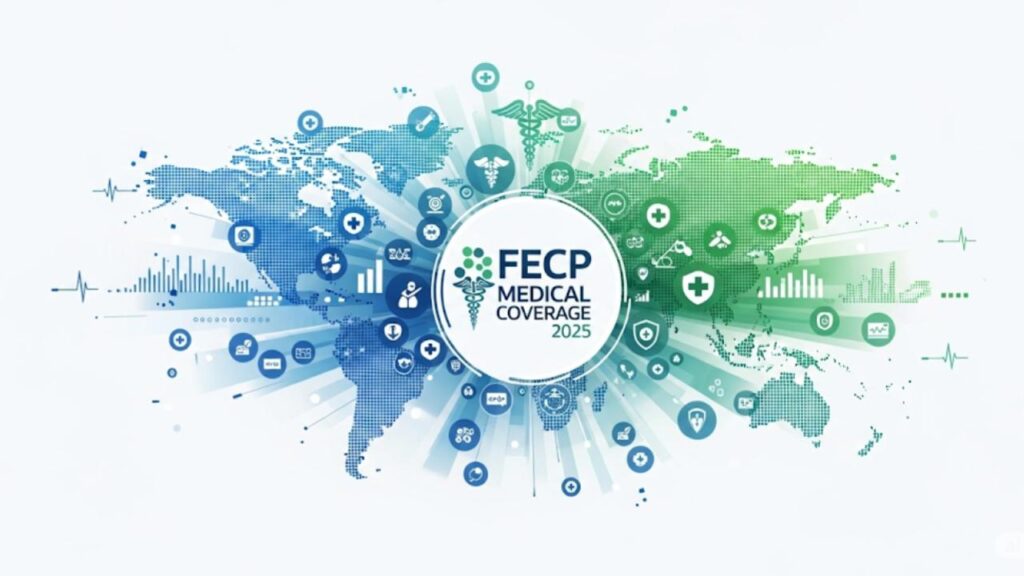FECP Medical Coverage 2025 is here, and folks, it’s straight fire. You’ll find new treatments covered under the Federal Employees’ Health Benefits (FEHB) / Federal Employees’ Choice Program (FECP). Whether you’re a mom-to-be, a professional juggling priorities, or someone watching your health journey, this guide serves up clear, accurate info—easy enough for a 10-year-old and insightful enough for seasoned professionals.

FECP Medical Coverage 2025 Just Expanded
| Feature | What’s New for 2025 | Why It Matters |
|---|---|---|
| Infertility & IVF Coverage | 45 plans now cover IVF, including 3+ cycles in some cases. BCBS Standard & GEHA High offer $25K benefits, with FSBP covering AIS and lowering coinsurance | Huge savings for hopeful families—covering equipment, meds, procedures |
| GLP-1 & Obesity Meds | At least one GLP-1 drug (e.g., Wegovy, Ozempic) plus two oral obesity meds must be covered | Offers more choice and support in weight management and chronic disease prevention |
| Telehealth | Teladoc visits now at $0 out-of-pocket | More care access, less hassle—US-wide convenience |
| Family Planning & Maternity | Free breast pump kits, covered salpingectomy | Eases costs and stress for new moms |
| Preventive Vaccines | Adult RSV and Mpox vaccines now included for high-risk groups | Protects vulnerable adults with emerging immunization needs |
| Overseas Care | No cost-share on primary care, specialist visits, or outpatient ER visits | Peace of mind for global employees or long-term travelers |
| Premium Impact | ~11.2% average premium increase | Weigh costs vs. coverage gains during Open Season |
FECP Medical Coverage 2025 brings major upgrades—from fertility and obesity treatments to telehealth and global care. The average premium increase of 11.2% might sting up top, but the real value lies in coverage that helps you live better and smarter. Aim for high-coverage plans that match your life stage and health goals, and maximize FSAs and benefits.
Why These Updates Matter
These updates mean families and individuals dealing with fertility, weight, or access issues now get real financial protection and expanded healthcare access. Gone are the days of juggling out-of-pocket bills, limited options, or passing up appointments. It’s about smart, accessible, and compassionate coverage.
1. Expanded Infertility & IVF Support
What’s Changed
- 45 FEHB plans now cover IVF, often with 3–4 cycles of medication.
- Big-name plans (BCBS Standard, GEHA High) offer $25,000 in IVF coverage, with coinsurance from 15–20%.
- Foreign Service Benefit Plan (FSBP) covers artificial insemination and low-cost IVF with 10% coinsurance.
Example
Let’s say Emma and Jay need three IVF cycles. Under a plan offering $25K coverage, they could save thousands—medications included. That means more time focusing on hope, less time stressing finances.
Pro Tip
Action Step: When selecting a plan, check if it includes both treatment and medication coverage, and what coinsurance applies.
2. GLP-1 Meds and Obesity Treatments
What’s New
- Mandatory coverage for:
- One GLP-1 injectable (like Wegovy, Ozempic).
- Two oral obesity meds (e.g. phentermine/topiramate).
These medications support weight management and metabolic health, backed by strong science around diabetes, heart health, and chronic disease control.
Why It’s a Game-Changer
Access to Wegovy or Ozempic can be life-changing, especially for chronic conditions like type 2 diabetes and heart disease. Supporting these meds helps you protect long-term health and reduce downstream costs.
Tips
- Ask your provider if your plan covers it after deductible and whether it’s on your formulary tier.
- Consider lifestyle programs alongside medication for double impact.
3. Telehealth Gets Real
What’s New
- Teladoc services covered at $0—easy access for visits with primary care providers, urgent care, and specialists nationwide.
Why It Matters
Say you’re home with a sick kid or traveling—no doctor nearby or no childcare? A quick Teladoc consult means peace of mind—affordable, accessible.
Quick Checklist
- Download the Teladoc app before travel or emergencies.
- Check if mental health services are included (many plans cover them).
4. Family Planning & Maternity Support
Improvements
- Breast pump kits now free for pregnant/nursing members.
- Covered salpingectomy as sterilization—no surprise bills.
Why It’s Vital
Less financial stress, better health, more control—maternity perks now mean more compassion, less red tape.
Real Talk
Sarah, a GS-9, saved $$$ by avoiding pay out-of-pocket for her pump and sterilization—signing up during Open Season paid off.
5. Added Vaccines: RSV & Mpox
What’s Covered
High-risk adults can now get RSV and Mpox vaccines at no cost under FEHB/FECP.
Why This Counts
These vaccines protect immunocompromised adults, seniors, and healthcare workers. Keeping these groups healthy lowers public health risk and keeps care accessible.
6. Overseas Coverage—Now Easier
The Deal
Fee-shares for primary care, specialist, and outpatient ER visits are waived for members living overseas or on assignments.
Why It’s Useful
If you’re based abroad—even temporarily—you get full outpatient care with no surprise bills. Relief for employees in foreign missions or remote posts.
7. Premiums Rising 11.2%—What That Means
Yes, premiums are up. But the expanded coverage can make it worth it.
Understanding Your Value:
- Calculate your annual healthcare spend (deductibles + coinsurance + meds).
- Compare across plans, looking beyond just premium dollars.
- Use flexible spending accounts (FSAs) for eggs or medications—tax-smart savings.
Practical Steps: What You Should Do
Step 1: Review 2025 Plan Options
- See which FEHB/FECP plans in your region offer IVF, GLP-1 coverage, and Teladoc access.
- Use OPM’s official source: OPM FEHB plans.
Step 2: Consider Your Needs
- Want children soon? Focus on IVF coverage tiers.
- Type 2 diabetes or weight concerns? Look for GLP-1 coverage.
- Travel or work abroad? Ensure Teladoc + overseas access.
Step 3: Crunch the Numbers
| Expense Type | Average Cost with Expanded Coverage | Without Coverage |
|---|---|---|
| IVF (3 cycles) | $25,000 max shared cost | $35,000+ out-of-pocket |
| GLP-1 meds (1 year) | Typically included/~$500 savings | $6,000–10,000 retail |
| Teladoc visits (5/yr) | $0 | $100+ total billing |
Step 4: Open Season Prep
- Dates: November – December 2024 (confirmed).
- Highlight must-haves (IVF, GLP-1, Teladoc) in your plan comparisons.
- Use online tools or speak with HR benefits advisor.
Step 5: After You Choose
- Download Teladoc app, and choose a preferred doctor.
- Double-check network coverage for IVF, fitness, and specialist care.
- Submit claims and use your FSA effectively.
FAQs
Q: Do ALL FEHB plans offer IVF?
A: Not all—but 45 plans do in 2025. Confirm during Open Season by checking your plan’s summary of benefits.
Q: Are GLP‑1 medications automatically covered?
A: Required to cover at least one injectable and two oral meds. Check formulary tier for co-insurance info.
Q: Can I still use my FSA with IVF and weight-loss programs?
A: Absolutely. FSAs can reimburse copays, deductibles, and eligible meds—just keep documentation.
Q: Does overseas coverage include hospital stays?
A: No—it covers outpatient ER & office visits. Hospital services are still subject to normal cost-sharing.








